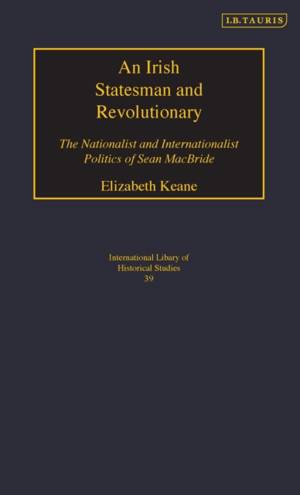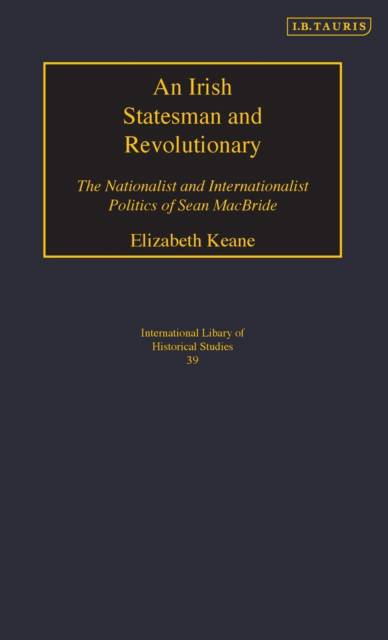
- Retrait gratuit dans votre magasin Club
- 7.000.000 titres dans notre catalogue
- Payer en toute sécurité
- Toujours un magasin près de chez vous
- Retrait gratuit dans votre magasin Club
- 7.000.0000 titres dans notre catalogue
- Payer en toute sécurité
- Toujours un magasin près de chez vous
An Irish Statesman and Revolutionary
The Nationalist and Internationalist Politics of Sean MacBride
Elizabeth Keane
296,95 €
+ 593 points
Description
This work examines one of the most interesting periods in Irish diplomatic history, that of the inter-party government of 1948-1951 and discusses the later career of Sean MacBride, Minister of External Affairs during that government. The book encompasses larger themes of Anglo-Irish history, Irish-American history, the political and ideological role of Catholicism in the construction of a viable democratic state, and the pervasive influence of nationalism. It pulls together threads dangling from a wide variety of sources, some of which have never been previously consulted by historians of republican Ireland, ranging from Irish, British, Northern Irish, American, Canadian and OEEC official material to several relevant private papers, including the newly released papers of John Costello, newspapers, and memoirs as well as the significant secondary literature. Elizabeth Keane investigates MacBride, the political party he founded, his time in government, his fall from power and his impact on Irish foreign policy.
He was involved in many significant events taking place in the emerging Irish Republic, including the official declaration of the republic, a renewed anti-partition campaign, and participation in European integration. Although he is generally praised for influencing the 1948 repeal of the External Relations Act, officially removing Ireland from the British Commonwealth, in contrast to existing literature on the topic this book argues that his most important contribution as Minister for External Affairs involved expanding Ireland's role in Europe by joining the Organization of European Economic Cooperation (OEEC) and the Council of Europe. His attempts to draw worldwide attention to the problem of partition and negotiations with the United States were less successful, which proved ironic, as eliminating partition and a close relationship with the United States were major themes in Ireland's history. His career outside Irish politics also had an impact on the nation.
MacBride's participation in the International Commission of Jurists, his role in founding and developing Amnesty International, and his receiving the Nobel Peace Prize had a positive effect on Irish foreign policy and served as a counterpoint to growing tensions in Northern Ireland. Elizabeth Keane offers us the first comprehensive portrait of MacBride's influence on Irish foreign policy and underscores his importance to both the development of the Irish nation and global concerns. Moreover, it places him in a larger picture and draws attention to evolution and change in a country sometimes perceived as stagnant.
He was involved in many significant events taking place in the emerging Irish Republic, including the official declaration of the republic, a renewed anti-partition campaign, and participation in European integration. Although he is generally praised for influencing the 1948 repeal of the External Relations Act, officially removing Ireland from the British Commonwealth, in contrast to existing literature on the topic this book argues that his most important contribution as Minister for External Affairs involved expanding Ireland's role in Europe by joining the Organization of European Economic Cooperation (OEEC) and the Council of Europe. His attempts to draw worldwide attention to the problem of partition and negotiations with the United States were less successful, which proved ironic, as eliminating partition and a close relationship with the United States were major themes in Ireland's history. His career outside Irish politics also had an impact on the nation.
MacBride's participation in the International Commission of Jurists, his role in founding and developing Amnesty International, and his receiving the Nobel Peace Prize had a positive effect on Irish foreign policy and served as a counterpoint to growing tensions in Northern Ireland. Elizabeth Keane offers us the first comprehensive portrait of MacBride's influence on Irish foreign policy and underscores his importance to both the development of the Irish nation and global concerns. Moreover, it places him in a larger picture and draws attention to evolution and change in a country sometimes perceived as stagnant.
Spécifications
Parties prenantes
- Auteur(s) :
- Editeur:
Contenu
- Nombre de pages :
- 264
- Langue:
- Anglais
- Collection :
Caractéristiques
- EAN:
- 9781845111250
- Date de parution :
- 31-03-06
- Format:
- Livre relié
- Format numérique:
- Genaaid
- Dimensions :
- 152 mm x 215 mm
- Poids :
- 421 g

Les avis
Nous publions uniquement les avis qui respectent les conditions requises. Consultez nos conditions pour les avis.






